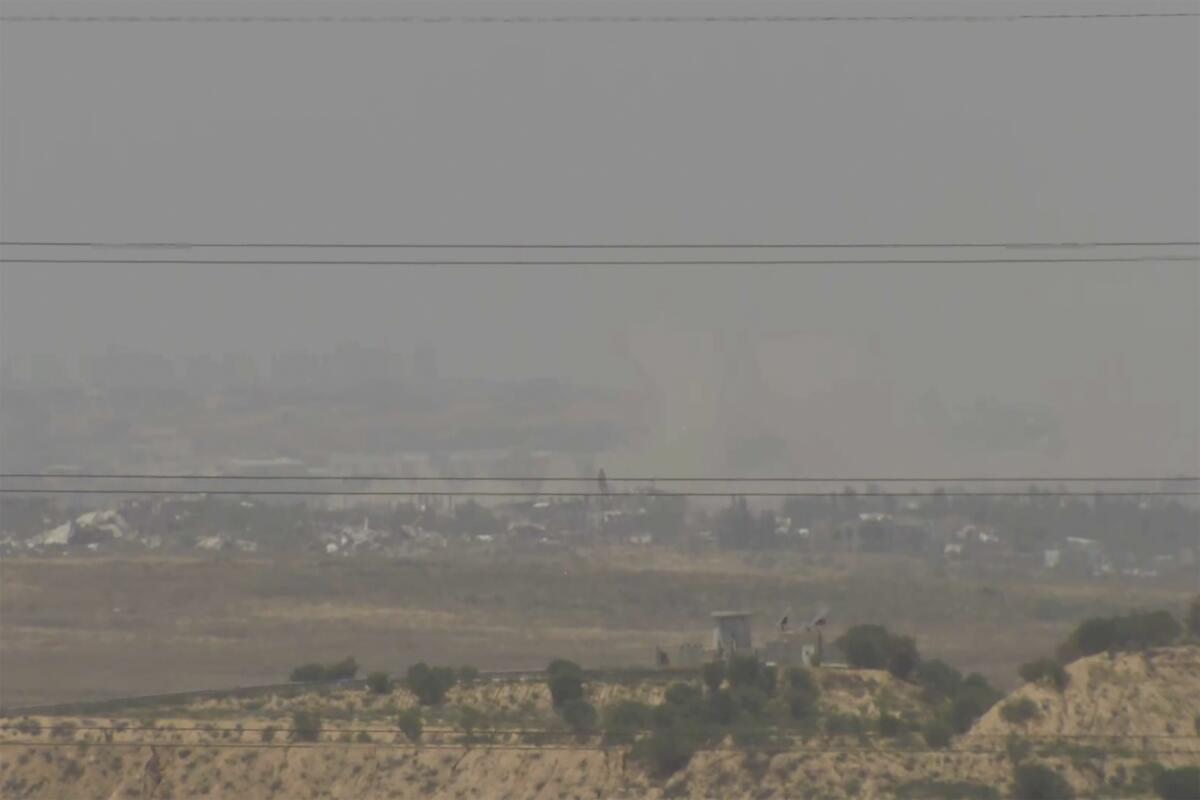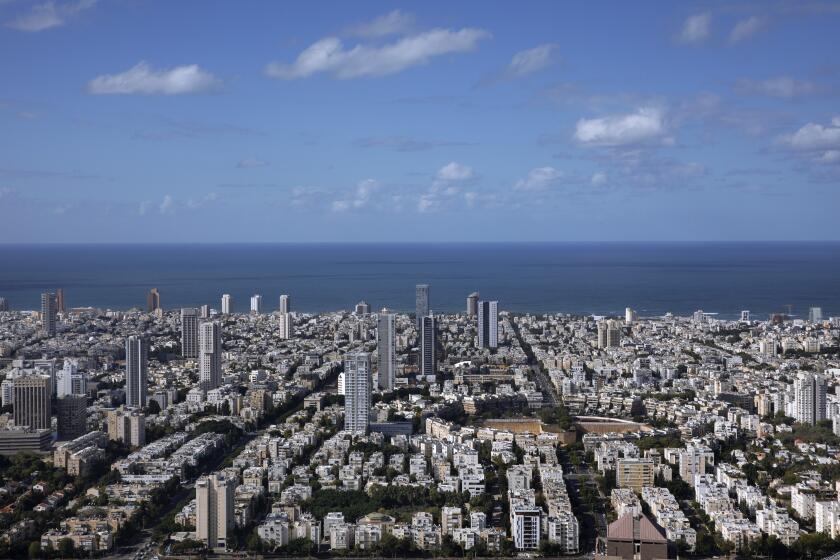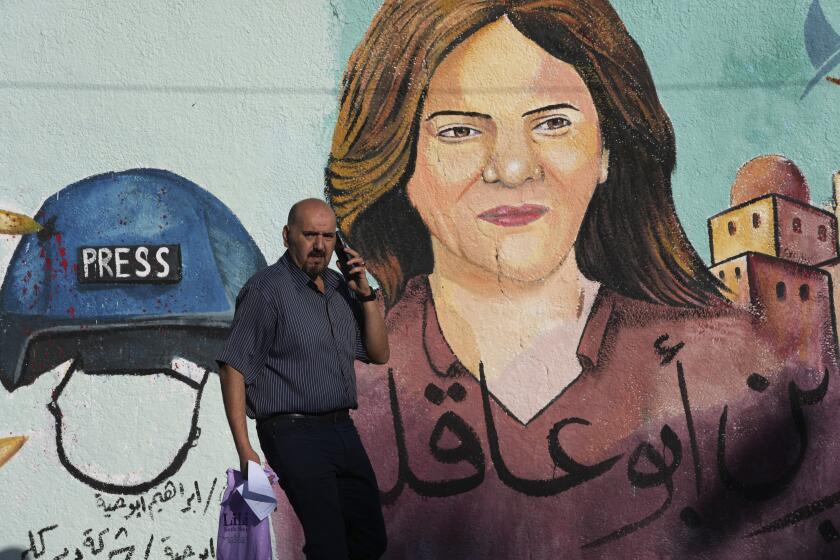Israel says it will return video equipment seized from the Associated Press

- Share via
JERUSALEM — The Israeli government will return a camera and broadcasting equipment it had seized from the Associated Press on Tuesday, reversing course hours after blocking the news organization’s live video of Gaza.
The government seized the AP equipment from a location in southern Israel after accusing it of violating a new media law by providing images to the satellite channel Al Jazeera.
Israeli officials used the law May 5 to close down Qatar-based Al Jazeera within Israel, confiscating its equipment, banning its broadcasts and blocking its websites.
After Israel seized the AP equipment, the Biden administration, journalism organizations and an Israeli opposition leader condemned the government of Prime Minister Benjamin Netanyahu and pressured it to reverse the decision.
Israel’s communications minister, Shlomo Karhi, said late Tuesday on the social platform X: “I have now ordered to cancel the action and return the equipment to the AP.”
The extraordinary order includes confiscating broadcast equipment and preventing the broadcast of the channel’s reports and blocking its websites.
Karhi said the defense ministry will undertake a review of news outlets’ positioning of live video of Gaza. Officials hadn’t previously told AP the positioning of its live camera was an issue. Instead, they repeatedly noted that the images appeared in real time on Al Jazeera.
Al Jazeera is one of thousands of AP customers, and it receives live video from AP and other news organizations.
“While we are pleased with this development, we remain concerned about the Israeli government’s use of the foreign broadcaster law and the ability of independent journalists to operate freely in Israel,” said Lauren Easton, vice president of corporate communications at the Associated Press.
Officials from the Communications Ministry arrived at the AP location in the southern town of Sderot on Tuesday afternoon and seized the equipment. They handed the AP a piece of paper, signed by Karhi, alleging it was violating the country’s foreign broadcaster law.
Shortly before its equipment was seized on Tuesday, AP was broadcasting a general view of northern Gaza. The AP complies with Israel’s military censorship rules, which prohibit broadcasts of details such as troop movements that could endanger soldiers. The live video has generally shown smoke rising over the territory.
The AP had been ordered verbally last Thursday to cease the live transmission, which it refused to do.
Prime Minister Benjamin Netanyahu has vowed to shut down Al Jazeera’s operations in Israel, calling it a “terror channel” that spreads incitement.
Israel’s opposition leader Yair Lapid called the government’s move against AP “an act of madness.”
Karhi responded to Lapid that the law passed unanimously by the government states that any device used to deliver Al Jazeera content could be seized.
Condemnation from journalism organizations was swift, and the Biden administration also put pressure on Israel.
“As soon as we learned about the reports, the White House and the State Department immediately engaged with the Government of Israel at high levels to express our serious concern and ask them to reverse this action,” said Adrienne Watson, a spokesperson for the National Security Council. “The free press is an essential pillar of democracy and members of the media, including AP, do vital work that must be respected.”
When Israel closed down Al Jazeera’s offices earlier this month, media groups warned of the serious implications for press freedom in the country. The law gives Karhi, part of the hard-right flank of Netanyahu’s Likud Party, wide leeway to enforce it against other media.
“Israel’s record on press freedom already has been dismal throughout the war,” the Foreign Press Association said in a statement on Tuesday. “It has prevented independent access to Gaza for foreign journalists.”
The killing of journalists in the Gaza Strip is being normalized. President Biden and other world leaders must do more to protect them.
The AP live video shot from Sderot has provided a rare independent glimpse of the situation in Gaza.
Israel has long had a rocky relationship with Al Jazeera, accusing it of bias against the country, and Netanyahu has called it a “terror channel” that spreads incitement.
Al Jazeera is one of the few international news outlets that has remained in Gaza throughout the war, broadcasting scenes of airstrikes and overcrowded hospitals and accusing Israel of massacres. AP is also in Gaza.
During the previous Israel-Hamas war in 2021, the army destroyed the building housing AP’s Gaza office, claiming Hamas had used the building for military purposes. The AP denied any knowledge of a Hamas presence, and the army never provided any evidence to back up its claim.
The war in Gaza began with a Hamas attack in Israel that killed 1,200 people and saw 250 others taken hostage. More than 35,000 Palestinians have been killed since then, according to Gaza’s Health Ministry, which doesn’t distinguish between civilians and combatants in its count.
Federman and Kirka write for the Associated Press. Kirka reported from London. Zeke Miller, Aamer Madhani, and Seung Min Kim in Washington contributed to this report.
More to Read
Sign up for Essential California
The most important California stories and recommendations in your inbox every morning.
You may occasionally receive promotional content from the Los Angeles Times.












